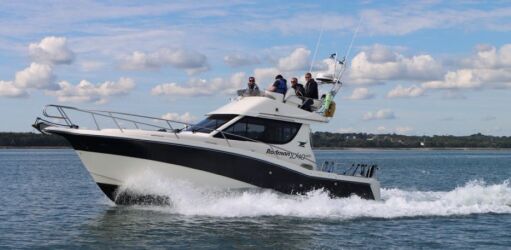RYA Motor Cruising Coastal Skipper Practical Course In Southampton

RYA Coastal Skipper Motorboat Cruising Practical Course Summary
Course Duration: 4 days - 9am to 5pm Approximately
Course Cost: From £1299
 The 5 day RYA Coastal Skipper Motor Cruising Course costs from £1299 per person and runs from our Southampton, Shamrock Quay Marina base. With classroom and boat only yards apart we have the perfect teaching setup.
The 5 day RYA Coastal Skipper Motor Cruising Course costs from £1299 per person and runs from our Southampton, Shamrock Quay Marina base. With classroom and boat only yards apart we have the perfect teaching setup.
We would expect students to have both theory and practical skills to at least day skipper level but with 15 days ( 2 as skipper ) at sea. Also 8 hours at night would be advised.
By the end of the course you will be able to take a motor cruiser on coastal passages by night & day.
RYA Motor Cruising Coastal Skipper Syllabus
Passage planning
Can plan a coastal passage including a consideration of the capability of the motor cruiser, navigation, victualling, weather, ports of refuge, tidal heights and tidal streams, publications required and strategy
Understands fuel consumption at various speeds and can calculate fuel required for passage including reserve
Aware of the effects of fouling on boat speed and fuel consumption
Knows customs procedures
Preparation for sea
Is aware of safety equipment for offshore passages
Can prepare a motor cruiser for sea including stowage, safety briefing, watch keeping, delegating responsibilities and equipment, fuel and engine checks
Pilotage
Can prepare a pilotage plan, with consideration of soundings, transits, clearing bearings, buoyage, port or harbour regulations and tidal considerations
Can pilot a motor cruiser by day and night.
Passage making and ability as skipper
Can take charge of a motor cruiser and direct the crew
Can organize the navigation, deckwork and domestic duties of a motor cruiser on passage
Aware of the significance of meteorological trends
Is aware of crew welfare on passage
Can use electronic navigational equipment for pre-planning and undertaking a passage and can update when underway, especially the use of waypoints and routes.
Passage making and ability as skipper
Understands the use of radar as an aid to navigation, pilotage, collision warning and collision avoidance
Boat handling
Can control the boat effectively in a confined space including all berthing and unberthing situations in all conditions of wind and tide
Can berth and unberth in simple situations using one engine on a twin engine boat and the use of lines whilst doing this
Avoids excessive use of power
Adverse weather conditions
Preparation for heavy weather and handling in strong winds
Navigation and general conduct in restricted visibility
Emergency situations
Recovery of man overboard
Understands action to be taken when abandoning to the liferaft and during helicopter rescues



